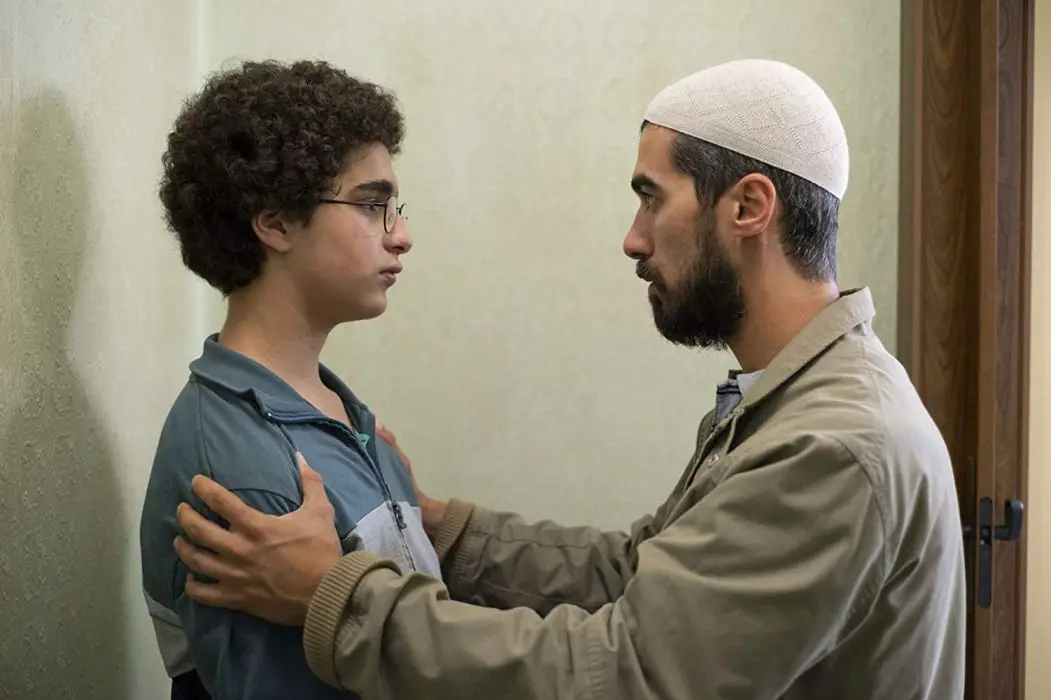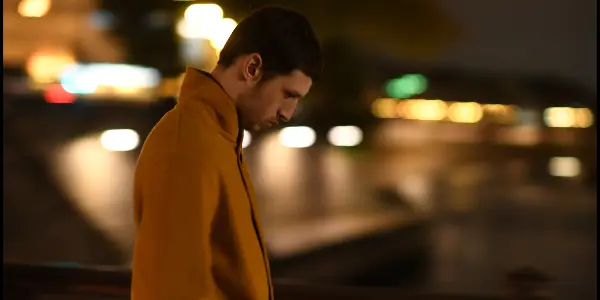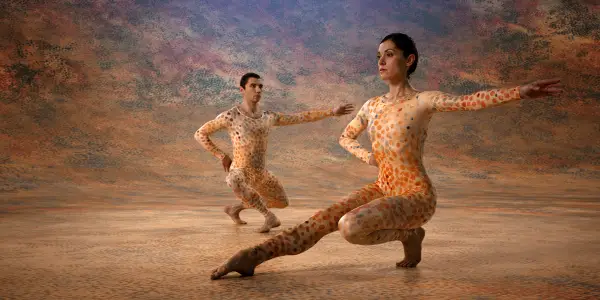NYFF 2019: SYNONYMS, YOUNG AHMED & CUNNINGHAM

Kevin L. Lee is an Asian-American critic, producer, screenwriter and…
First time attending the New York Film Festival. Second time being in New York ever. I would be lying if I said I wasn’t anxious or nervous to attend this. But with incredible titles like Parasite, Portrait of a Lady on Fire, and the imminent premiere of Martin Scorsese’s gangster epic The Irishman, NYFF57 looked like it will be quite the experience.
What I didn’t really expect was how the festival scheduled the press and industry screenings, specifically their choice of Day 1 titles. With Synonyms, Young Ahmed, and Cunningham being the first three films to start my NYFF experience, I knew I was in for something incredibly foreign, independent, and eye-opening.
Synonyms (Nadav Lapid)

An Israeli man named Yoav (Tom Mercier) has just moved into a cold unfurnished apartment in Paris, only to have his belongings stolen while he’s taking a shower. Saved by Emile and Caroline (Quentin Dolmaire, Louise Chevillotte), the couple living downstairs, Yoav makes the first of many bonds in a foreign country that he pledges to be his new national and cultural identity.
Yoav is a man very much like the director Nadav Lapid. Both served the military in Israel and later developed an urge to leave the country. Both entered France with no visa, no job, and no connections. Both refused to speak Hebrew for the rest of their lives, walking along the streets of Paris with a French dictionary in their hands. Supported by Lapid’s own life story and elevated by an explosive debut performance by Mercier, Synonyms is a chaotic two hours of following a broken, vulnerable, hardened man trying to form a new identity by tearing down his origin.
Perhaps the greatest image in the film is how Yoav sheds his military uniform back in Israel in exchange for another uniform – the yellow jacket he wears throughout the runtime. Lapid’s way of exploring this idea, however, is where things start to get a bit weird and messy. The film plays out like a series of events, barely strung together by a plot or a situation that needs to be resolved. There are sporadic highlights found here, from the sad irony of Yoav sharing his idolization of the Trojan warrior Hector when he was a child to Yoav recounting his experience shooting a rifle to the rhythm of “Je Ne Veux Pas Travailler.” In between those highlights, however, are bizarre moments or subplots that didn’t seem to go anywhere.
The episodic narrative left me more confused than emotionally affected. Events are seemingly tossed away just as quickly as they happened. Half the time, I was desperately trying to figure the story out and understand whether or not Lapid is building towards something. Then every once in a while, a camera or editing decision is made that felt like the equivalent of tonal whiplash.
Synonyms is a baffling film, full of humor, anger, moments that hit hard, and moments that didn’t work for me at all. It has a lot going on at once, and it guarantees a bright career ahead for Mercier. I’m still sitting here scratching my head over the directing choices, but I can say I was never bored and the political and existential ideas in the film are definitely worth talking about.
Young Ahmed (Jean-Pierre & Luc Dardenne)

The Dardennes are some of my favorite filmmakers when it comes to capturing the passage of time among a handful of characters. Their films play like a window, where we’re given an opportunity to peak into the lives of people who look like they were just found there on the spot. But another sensibility they seem to have as directors is knowing what information to withhold from the audience and knowing how to use a character’s decisions to put additional weight on their social commentaries. It is this sensibility that I found sorely missing in Young Ahmed.
Young Ahmed is a frustratingly straightforward story about a little Muslim boy named Ahmed (Idir Ben Addi), who, after learning and absorbing an extremist interpretation of the Qur’an, is driven to commit an act of violence. On paper, this isn’t a terrible idea. The premise could offer some difficult but necessary commentary on how without context or external guidance, anyone can become radicalized. But the Dardennes maintain an emotional distance this time around, yet all there is in the narrative is following Ahmed around in his daily mundane activities.
These activities don’t exactly form a subtext, nor do they help in getting the audience to relate to Ahmed as a protagonist. This is largely because the narrative in Young Ahmed is told in an uninteresting linear fashion. No information is withheld from us, nor does the script reveal any new information to us as the film progresses. As you approach the third act, you’re left wondering just what the heck is the film trying to say, if anything.
From a technical standpoint, Young Ahmed is beautiful to look at. The look and feel is drastically different from past films like The Kid with a Bike and Two Days, One Night – a rare departure from their usual director of photography Alain Marcoen. The handheld camerawork feels spontaneous and unpredictable, which offers some well-staged suspense at the right time. Lastly, there’s a lovely supporting performance by Victoria Bluck as Louise, a girl Ahmed meets and potentially falls for. Their rare chemistry is so good that you’d wish Louise is a far more substantial character and is further written into the story.
The problem with Young Ahmed is the Dardennes kept a distance from Ahmed, as if afraid to mislabel him or suggest the wrong idea of his religion, thereby ending up with very little to say. For the first time in my experience watching films made by them, they finally made a film where I don’t think they are the appropriate choice for writer and director.
Cunningham (Alla Kovgan)

I can admit that I was not too familiar with the works of Merce Cunningham. I walked into Cunningham with a pair of 3D glasses and the knowledge that he is one of the most influential figures in modern dance. I walked out realizing his dance exhibitions are some of the most immaculate choreographies I’ve ever seen.
The biggest strength of Cunningham is the full-fledged recreations of Cunningham’s works, from Suite for Five (1956-1958) to Rainforest (1968), where the man collaborated with Andy Warhol. The documentary drowns out the borders of the screen and creates almost a live stage right in front of your eyes – the 3D elevates that illusion further. With John Cage’s piano-oriented music and gorgeous costumes provided by famous painter Robert Rauschenberg, Cunningham’s dance choreographies are stunning to watch. You’ve never seen the human body move in such a way.
Where Cunningham starts to have problems for me is its lack of narrative, or its attempts at creating a narrative to connect the dance exhibitions together. Using a series of archival footage and audio, the documentary struggles to maintain a connective tissue in between dance sequences. Not only does the footage quickly become repetitive, they force the narrative to be structured in linear chronological order. They do little in educating me about Cunningham’s personality and career, other than the few artists he has collaborated with in the past, nor do they ground the story to today’s context to better understand how influential he is and why his story is worth sharing to everyone.
Sometimes you don’t need a narrative in your documentary. Sometimes your silver bullet is so powerful that it speaks for itself. In the case of Cunningham, that silver bullet is the dance choreography. Anyone, even someone not interested in dance, can tell that Cunningham’s work and his ability to stretch the human body is impressive here. For me, Cunningham works better as a Greatest Hits compilation of Cunningham’s works. Either let the dances dictate how the documentary flows and cut down on the archival footage, or add additional context, interviews, and analysis on Cunningham so the narrative becomes more interesting to watch.
Does content like this matter to you?
Become a Member and support film journalism. Unlock access to all of Film Inquiry`s great articles. Join a community of like-minded readers who are passionate about cinema - get access to our private members Network, give back to independent filmmakers, and more.
Kevin L. Lee is an Asian-American critic, producer, screenwriter and director based in New York City. A champion of the creative process, Kevin has consulted, written, and produced several short films from development to principal photography to festival premiere. He has over 10 years of marketing and writing experience in film criticism and journalism, ranging from blockbusters to foreign indie films, and has developed a reputation of being “an omnivore of cinema.” He recently finished his MFA in film producing at Columbia University and is currently working in film and TV development for production companies.













